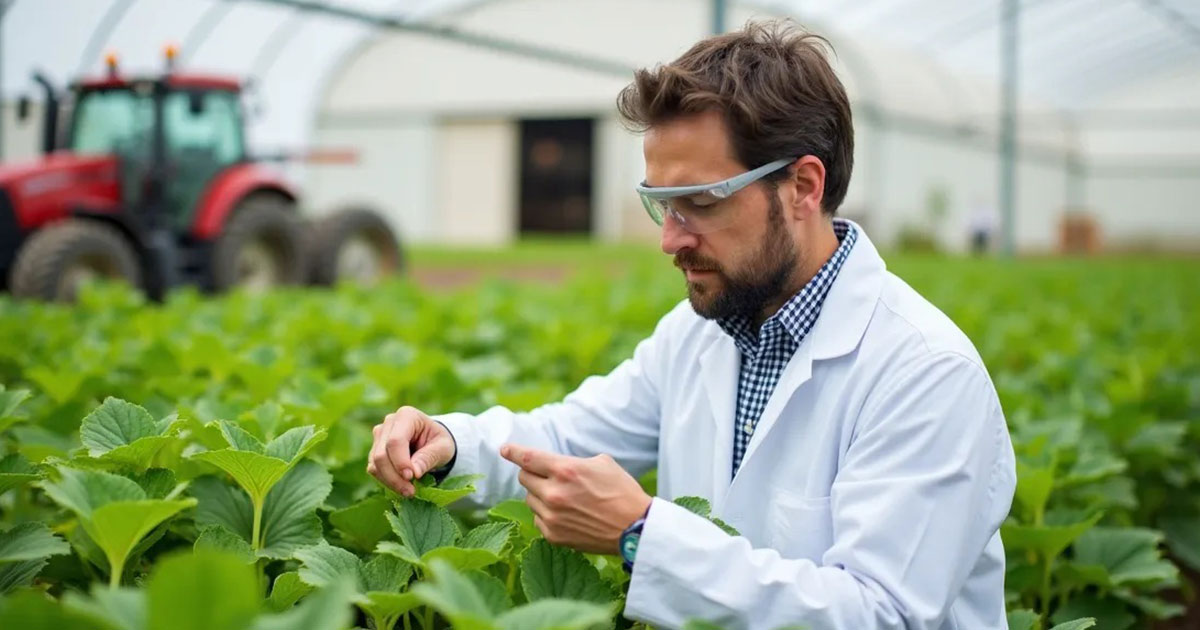
Diploma in Agronomy
By NCTA Team Last Updated: December 31, 2025Overview:
Agronomy is a branch of agricultural science that focuses on the principles and practices of crop production and soil management to optimize agricultural productivity and sustainability. It combines elements of biology, chemistry, ecology, earth science, and genetics to address the efficient and sustainable use of natural resources in farming.
About the Course:
Diploma in Agronomy is a two-year program designed to provide students with in-depth knowledge and practical skills in the science and practice of crop production and sustainable farming. This program combines theoretical learning with hands-on training to prepare students for a dynamic career in agriculture.
Students will explore topics such as soil science, crop physiology, pest and disease management, irrigation techniques, and sustainable farming practices. They will also gain exposure to modern agricultural technologies, including precision farming, climate-smart agriculture, and farm mechanization.
The curriculum emphasizes sustainable agriculture, addressing global challenges such as food security, environmental conservation, and climate adaptation. With a blended mode of learning, the course offers a mix of online theoretical classes and practical sessions conducted on farms or research centers, ensuring a comprehensive understanding of agronomy principles.
Graduates of this program are well-equipped to pursue careers as agricultural technicians, farm supervisors, soil specialists, and crop consultants, or to become entrepreneurs in the field of organic and sustainable farming.
Applications of Agronomy:
Agronomy plays a vital role in addressing global challenges such as food security, resource conservation, and climate change adaptation. It is integral to modern agriculture and contributes to increasing productivity while ensuring sustainability.
Agronomists work in diverse fields, including research, farm management, policy development, and environmental conservation, making it a cornerstone of agricultural progress.
Why Choose Diploma in Agronomy:
- Comprehensive Knowledge: Gain expertise in crop production, soil science, pest management, and sustainable farming practices.
- Practical Learning: Blend theoretical knowledge with hands-on training and real-world application.
- Career Growth in Agriculture: Access diverse career opportunities in farming, research, and agribusiness.
- Sustainable Agriculture Focus: Learn sustainable farming practices to address global environmental and climate challenges.
- Cutting-Edge Technologies: Master the latest advancements in precision agriculture and farm mechanization.
- Flexibility and Convenience: Benefit from a blended learning approach with online classes and practical sessions.
- Entrepreneurial Opportunities: Gain the skills to start your own farming venture or agribusiness.
- Global Relevance: Contribute to global agricultural solutions, ensuring food security and sustainability.
Responsibilities of an Agronomist:
- Develop and implement strategies for growing various crops, ensuring optimal yields and quality.
- Assess soil quality, recommend soil improvement techniques, and manage soil fertility for sustainable farming.
- Identify crop pests and diseases, and design integrated pest management strategies to minimize damage.
- Plan and oversee irrigation systems to optimize water use and maintain healthy crop growth.
- Promote and implement eco-friendly farming practices, such as crop rotation, organic farming, and conservation agriculture.
- Provide expert advice to farmers and agricultural businesses on crop production, land management, and technology adoption.
- Develop strategies to adapt farming practices to changing weather patterns and climate conditions.
- Educate farmers and agricultural workers on the latest agronomy practices, technologies, and innovations to improve productivity.
Course Curriculum:
This curriculum provides a well-rounded foundation in agronomy, blending theory with practical experience, and preparing students for success in the rapidly evolving agricultural sector. Key subjects include:
Semester I:
- Introduction to Agronomy
- Soil Science and Fertility Management
- Crop Physiology and Botany
- Principles of Irrigation and Water Management
Semester II:
- Weed Management
- Crop Production Techniques
- Introduction to Pest and Disease Management
- Field Crop Management
Semester III:
- Advanced Crop Protection
- Climate-Smart Agriculture
- Agricultural Economics and Farm Management
- Precision Agriculture and Technology
Semester IV:
- Sustainable Agriculture and Conservation Practices
- Seed Technology and Plant Breeding
- Farm Machinery and Mechanization
- Advanced Agronomy Techniques
Career Opportunities:
Upon completing the Diploma in Agronomy, graduates are equipped with the knowledge and skills required to excel in the diverse and evolving field of agriculture. With a strong foundation in crop production, soil management, pest control, and sustainable farming practices, graduates have numerous career opportunities across various sectors. Some of the career paths you can pursue include:
- Agronomist
- Soil Scientist
- Crop Production Specialist
- Pest and Disease Management Specialist
- Farm Manager
- Agricultural Consultant
- Agricultural Researcher
- Climate-Smart Agriculture Specialist
- Seed Production Specialist
Salary Expectations:
After completing the Diploma in Agronomy, graduates can expect a range of salary levels based on their job role, experience, and location. Entry-level positions typically offer salaries between $40,000 and $55,000 annually, while experienced professionals can earn between $60,000 and $80,000 per year. With seniority or specialization, salaries can increase significantly, reaching $85,000 to $100,000 or more. Roles in agribusiness, climate-smart agriculture, and precision agriculture, especially for those with experience or entrepreneurial success, can also exceed $100,000 annually.
Course Features
| Course Code | UDC-662 |
| Duration | 2 Years |
| Category | Diploma in Agronomy |
| Eligibility | XII with *PCB* from recognized board |
| Fees | 2x40000= 80,000 |
To know more about our this course, feel free to call us at:
+91 9733600770Ready to Enroll in This Course?
Start your learning journey today and unlock your potential!
Apply Now for This Course
